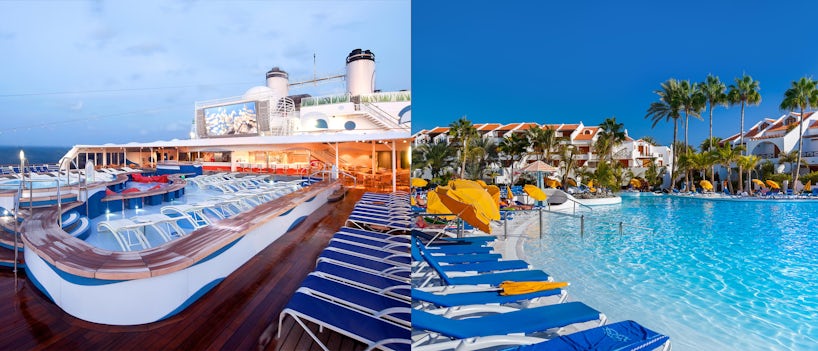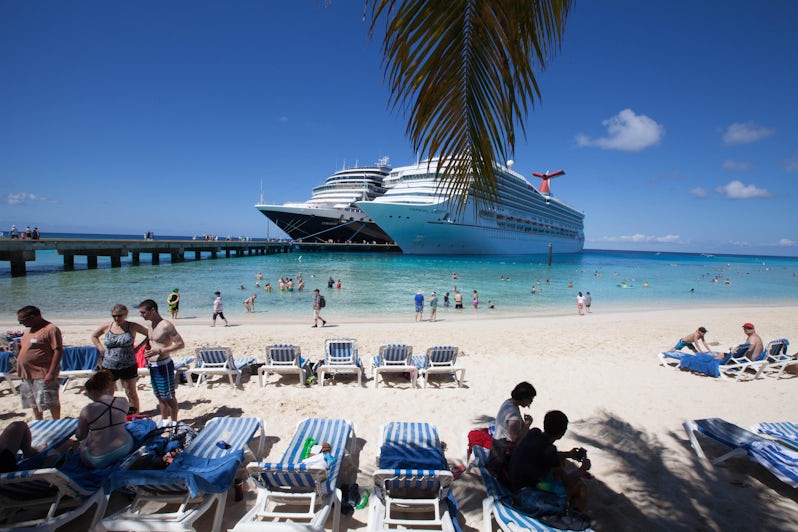
Cruise vs. All-Inclusive Resort: Which Is the Better Deal?


If you're looking for a getaway where everything is taken care of, which vacation type -- a cruise or an all-inclusive resort -- is truly the better deal? The answer isn't black and white, but we'll break down what you get with each, so you can determine which is best for your next vacation.
On This Page
The Pros and Cons of Cruising
Cruising has two main advantages over resorts. The first is the obvious one -- cruise ships move. That means on one weeklong vacation, you can visit multiple destinations without figuring out transportation logistics or packing your bags several times. It also means that ships can seek out the best weather. Cruise during hurricane season, and your ship will alter its route to get out of a storm's way; book a resort stay, and you've got nowhere to go if a hurricane is bearing down on your island.
The other is that modern-day cruise ships are packed to the gills with onboard activities. The newest ships sport rope courses, water parks, mini-golf, movie screens and rock climbing walls and crazy attractions like ziplines, bumper cars, surfing and skydiving simulators and other thrill rides.
Daily schedules are filled with wine tastings, dance classes, educational programming, trivia games and other activities. Evenings bring Vegas-style shows, Broadway musicals, comedy, magic acts and a variety of live music and dancing. Cruise ships also have dedicated youth areas with kid-specific and family-friendly programming, for tots to teens, day and night. It takes work to be bored on a cruise ship.
While cruise fares appear all-inclusive, however, that is misleading. Your cruise fare will generally cover onboard accommodations, meals in a few (but not all) onboard eateries, select nonalcoholic beverages (usually juice at breakfast and iced tea at lunch), pool use, daytime kids' programs and port stops in multiple destinations.
You will pay extra for soda, alcohol, specialty coffees, meals in specialty restaurants, gratuities and select onboard activities. And that's on top of paying for shore excursions, spa treatments, fitness classes, commemorative photos and souvenirs. (Luxury, expedition and river ships tend to have more fare inclusions… and higher prices.)
The Pros and Cons of All-Inclusive Resorts
All-inclusive resorts, on the other hand, have rates that encompass much more. This means easier budgeting and no end-of-trip surprises. Head to a land-based all-inclusive, and your payment will include meals at all onsite restaurants, all drinks (soda, alcohol, coffee), beach and pool access, daytime activities like beach sports challenges, fitness classes, kids programming and nonmotorized water sports like snorkeling, kayaking and water bikes.
Some may even include scuba and snorkel trips, beach and restaurant access at sister properties, and golf outings; others may provide resort credit to "pay" for activities like zipline outings and ruins tours, or offer one free excursion per passenger.
The main benefit of this style of vacation is that it's incredibly relaxing. You can spend the entire day in the pool if you'd like -- sometimes even ordering food and drink without leaving the water. You can take out a kayak or go snorkeling if you like, but it's a lazy venture from the property, not an all-day excursion. And if you love the beach, you can head into the waves whenever you want, rather than waiting for a ship to dock.
Resorts also have more space than compact cruise ships. Standard hotel rooms will be larger than cruise cabins, and some resorts might have options for overwater bungalows or casitas for more space and more privacy. On the flip side, you might find that you're doing more walking to get from your room to the beach to the restaurant if you're at a large resort.
Evening activities tend to center around drinking and dancing, rather than shows, which can be a plus or minus depending on your taste. Kids' programming and facilities are not always as organized as on cruise ships.
And, of course, you're limited to the resort area. That means you'll likely only experience one area of one island -- or possibly never leave the resort grounds except to have dinner at a sister resort. If the weather gets bad, you're stuck.
Cruise vs. All-Inclusive Resort: Which Is Cheaper?

It's hard to compare apples to apples to find out whether a cruise or all-inclusive resort is cheaper. Ted Blank, a luxury travel advisor and manager with Travel Leaders in Stillwater, MN, priced out a couple of vacation options, so we could compare.
A weeklong Royal Caribbean cruise to the Caribbean in February started at $2,050 total for two people in an inside cabin (or $2,220 for an outside cabin), including port charges. An entry-level room in the four-star Riu Palace Costa Mujeres, just north of Cancun, cost $2,950 for a couple, while a similar room at a Secrets Resort in nearby Playa Mujeres, a property Blank considers a closer match to Royal Caribbean, cost $4,644 for two.
That's roughly double for the comparable all-inclusive. However, all drinks, dining and Wi-Fi are included at the resorts, whereas cruise passengers would need to pay extra for beverage packages, internet and specialty dining, adding to the cost of the cruise.
On the upscale end, Blank priced a 10-night Caribbean cruise on Oceania (including port charges, domestic airfare and your choice of complimentary shore tours, beverage package or onboard credit) from $7,700 for two people (or $770 per night) in an outside cabin. The top-of-the-line, all-suite Grand Velas Resort with a similar focus on the culinary experience costs $6,500 per couple ($928 per night) for a weeklong stay in a non-oceanview suite. Again, the cruise is cheaper and includes airfare, but the resort will offer a larger room.
Generally, the base cruise fare will be cheaper when comparing similar vacations. The amount of extra purchases you make for tours, drinks, spa treatments and other extras will really determine whether a cruise or resort is the better deal for you.
When you do these calculations, don’t forget to include airfare. Most all-inclusive resorts are located outside the United States, making flying a necessity; however, depending on your location and how you book, you might find reasonable air deals to the big resort destinations in Mexico, the Dominican Republic and Jamaica.
Cruises, on the other hand, depart from a large selection of U.S. cities. Depending on where you live, you might be able to drive there or book a cheap flight -- saving on total vacation costs. On the other hand, airfare could be pricy if you're flying cross-country or your home airport has limited nonstop flights to your cruise homeport, which would increase your travel spend.
The Bottom Line
No one books a vacation solely on price. Determining which option is the best value depends on your priorities and spending habits. With both cruises and resort stays, you can also find ways to save.
For example, if you never spend any time in your cabin on a cruise, you can save on a cheaper outside cabin instead of shelling out for a balcony cabin or suite you won't truly appreciate. Similarly, if you just need the beach and not a lot of activity or dining choice, then you probably don't need to splurge on a more expensive resort with all sorts of amenities.
Still need help determining which option is best for you? Here are a few guidelines:
Pick the cruise if:
You want to visit multiple destinations in a week and have plenty of activities to choose from when onboard.
You don't spend a lot on extras like shore excursions, spa treatments or specialty dining. The base prices for cruises are typically lower than prices for resorts because the cruise lines expect you to make up the difference in onboard purchases.
You don't drink. At an all-inclusive, you will be subsidizing someone else's alcohol consumption.
You drink wine. Many resorts have limited, uninspired wine lists, says Blank. Cruise lines have more extensive options, especially for connoisseurs, even though you have to pay for a glass or bottle.
You like Broadway-style entertainment at night. Resort entertainment, when there is some, tends to be more low-key, showcasing local acts, or centered around discos and night clubs.
You like to gamble. Few all-inclusive resorts have onsite casinos.
You have trouble with mobility, and like the self-contained nature of a cruise ship versus a resort, which can be spread out across a huge property.
You want to receive excellent service. Blank says that, in general, even the most affordable cruise lines, such as Carnival, offer more consistent and friendly service than many all-inclusive resorts.
Pick the resort if:
You're looking for a truly relaxing vacation, with very little on the schedule.
You like hanging out in a bathing suit all day. Most cruise lines make you put on a cover-up to grab a buffet meal.
You want to be able to walk on the beach at sunrise or sunset ... or any time you want. With a cruise, you're restricted to hours in port; at a resort, the beach is right out your front door.
You want to eat and drink as much as possible without worrying about racking up high bills for cocktails or trying out multiple dining options.
You plan on taking advantage of water sports and other activities. If you want to spend your vacation snorkeling, kayaking and body surfing, you'll save money at the resort where these activities are included versus a cruise, which charges for these activities in port.
You're an avid golfer or scuba diver. You can book resorts that are dedicated to these activities, with included or onsite offerings. On a cruise, you will only be able to book these tours on port days.
If you're still confused about which option is the best value for you -- both in terms of price and vacation satisfaction -- reach out to a travel agent. Most agents who sell cruises also sell all-inclusive resort vacations. Getting advice from an expert who's knowledgeable about different resorts and ships, as well as picking the trip that best meets your budget and holiday preferences, might be the easiest way to get the best value for your vacation dollar.